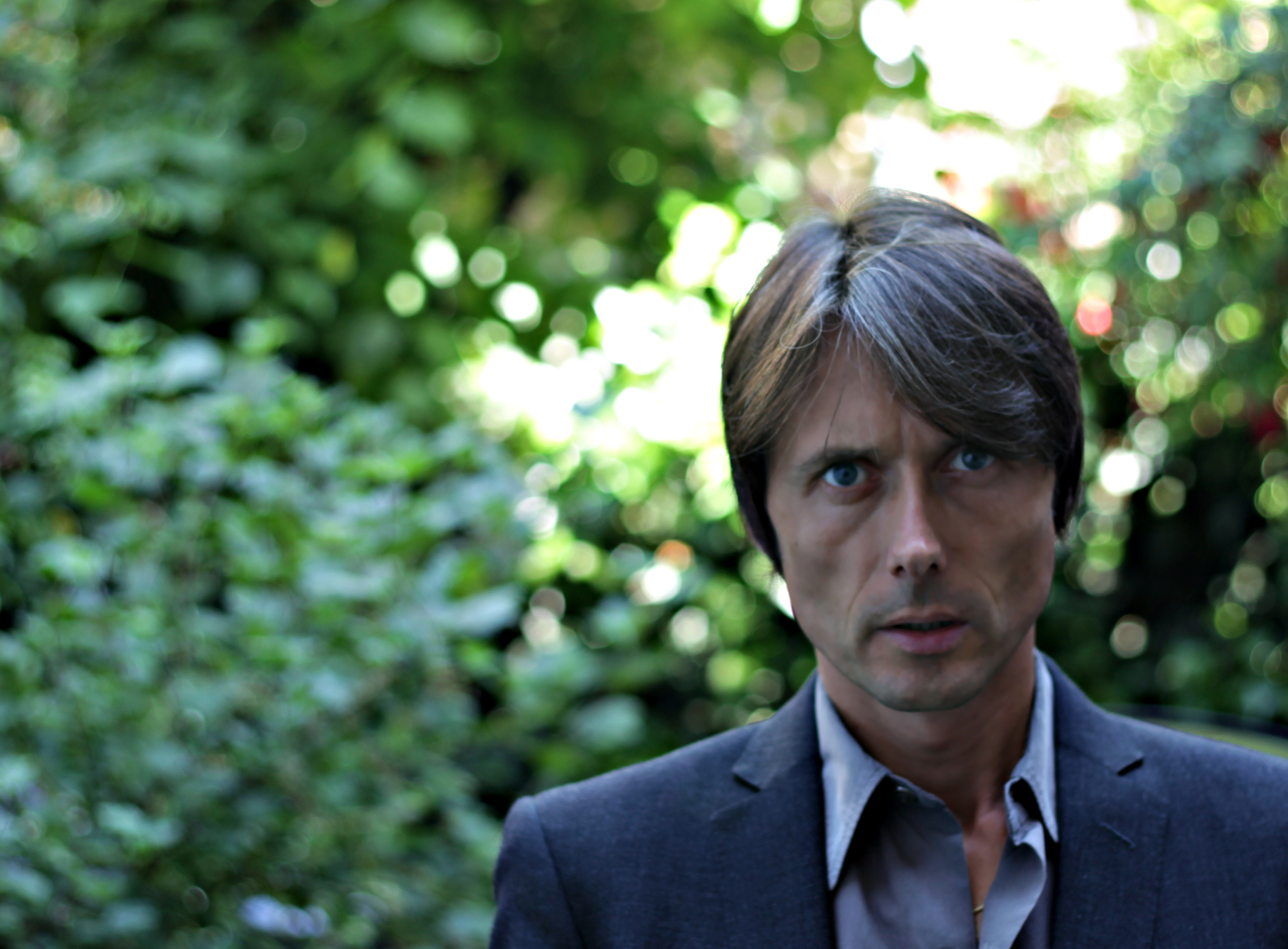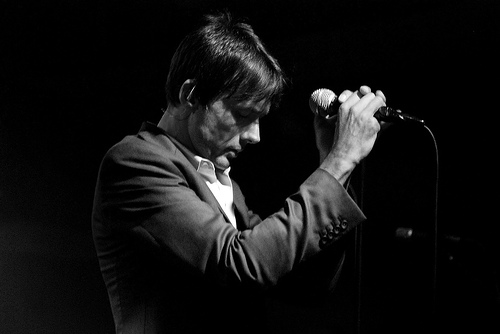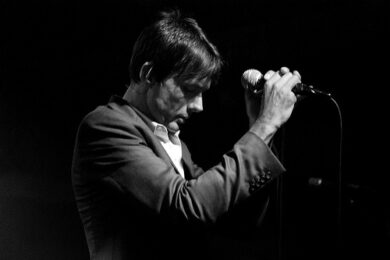Brett Anderson reclines haughtily in his chair on the secluded veranda of London’s Home House — a private member’s club for the capital’s glitterati — and stirs his cup of tea. “The interviews have been going pretty well so far," he muses, discussing the press schedule that comes with promoting a new record. “Largely because people have stuck to asking questions about the album. I’m not so desperate for the press coverage that I have to talk about my top ten tips for buying shoes or something like that."
He may not want to talk about fashion, but old habits die hard. The androgynous glamour of his former wardrobe has been discarded, but he still sports a dapper black jacket and a pair of expensive leather gloves. It’s these swish accessories he examines as he continues, “It’s a new chapter for me. I finally feel like I’m starting to establish my own identity as a solo artist.”
Indeed, there was a period when his former bands Suede and The Tears, both built around the songwriting partnership of him and guitarist Bernard Butler, were the only topics anyone wanted to ask him about. Messy musical divorces tend to generate that sort of voyeuristic interest — and also take their toll on the warring tribes. But with the forthcoming release of Slow Attack, his third solo album in as many years, Brett seems to have rediscovered his enthusiasm.
“It always an exciting moment when you’ve got an album just coming out," he enthuses. “You still haven’t got sick of the idea of it yet. But yeah, I’m really proud of it. For me it’s a huge step forward, it’s the next stage of developing as a solo artist. Stepping away from being in a band, doing different sorts of music . . . it’s a brave record. It wasn’t easy to make, and it probably isn’t easy to listen to.”
It’s certainly a marked departure from his previous works, whether it’s the sleazy pop melodies of Suede, the traditional rock-pop of his solo debut Brett Anderson, or the stripped-down aesthetic of Wilderness. It’s a lusher, fuller soundscape that bears more resemblance to a cinematic soundtrack than a conventional album.
“I was toying with the idea of having it completely instrumental," Brett reveals. “But my instincts pushed their ugly way through and imposed melody and vocals. And I guess sometimes you have to trust your instincts. I thought that releasing an instrumental album would be a step too far — running before I could walk. I’d like to think I could aim for that in the future, but not right now.”
Even though there are still vocals on Slow Attack, it nevertheless still explores more expansive territory than his previous work did. It would have been easy to assume that Brett would stick with the formula that gave Wilderness such a desolate beauty, with his piercing vocal supported by an isolated cello, but this time it’s woodwind that has taken Brett’s musical fancy — a decision he attributes to his co-writer Leo Abrahams, who he met through a mutual acquaintance. Is it a mutual partnership, I ask? Or is he in overall control?
Brett pauses. “Well, it’s my name on the record, but initially I wanted to call it something else. I thought we should call it, I don’t know . . The Lampshades," he says, spotting one out of the corner of his eye, “because his influence was so great. And there was a part of me that wanted to move away from being Brett Anderson, because all the baggage it brings pisses me off — I mean, reading reviews based on some quote I made in 1993. Contemporarise [sic], for fucks sake. In the end, we decided to stick with Brett Anderson, but his input was huge.”
And the woodwind was his idea?
“Yeah,” he laughs. “That was one of Leo’s genius strokes. One of the first things he said to me was ‘You should use lots of woodwind,’ and I just went [Pulls face] ‘Woodwind. What the fuck are you talking about?’. It’s not a very well used section of the orchestra, you know? You use brass, and strings, and piano, but not woodwind. But we tried a few things, and it worked, so we kept it.”
Other changes, though, stem purely from Brett. While in the past he tended to favour strong narrative lyrics with explicit, vivid images, Slow Attack favours a hazier approach to words. On a recent post on his blog, he made reference to Francis Bacon’s dictum that an artist’s role should be to “deepen the mystery”. Was that something that influenced his songwriting?
He nods. “Yes, that was a conscious decision. I didn’t want to write so figuratively, with so much clear narrative . . . I wanted to veer away from that and use words in a more impressionistic way. In the same way poetry is different from journalism — journalism pins something down, poetry hints at something deep with mystery. I wanted to be at that end of the spectrum. And because the music had complexity and depth, I didn’t want to smother it with words.”

Personal lyrics can bring unwanted personal interpretations, too, I suggest. With a background as widely documented as yours, it must get tiresome when people use your personal life as a tool to scrutinise your songs . . .
“That doesn’t specifically bother me," he shrugs, “but yes, I do get bored of constant interpretations of my songs because people are obsessed with certain parts of my life.
“People are obsessed about my relationship with Bernard Butler. I’ve never written a song about Bernard, but people think every song that hints at an argument or disagreement is about him. It’s not. It’s boring. I’m not interested in being a personality in my work. I don’t have the ego or need to be talking about myself and my own personal little myths. I’d like to step away from that selfish child, the ‘me me me’ thing.”
Stepping away from the selfish child and leaving the past behind seems to be the main focus of Brett’s agenda. At a recent live show in Notting Hill, which he described as the “best solo gig I’ve ever played”, he opted to play songs only from his solo back catalogue. There was no ‘Animal Nitrate’ or ‘The Drowners’. And with Slow Attack , he seems to have almost symbolically cleansed himself of the past tropes which identified him as a songwriter — the dirty guitar riffs, the unabashed pop hooks, the narrative lyrics. Was the idea of challenging himself as a songwriter something he found appealing?
“I suppose so," he nods. “Instinctively I can write pop songs in my sleep. It’s just the way my brain works. I hear top lines . . . I hear transistor radio music. I can just hear the melody. I think it comes from coming from a poor family, the stereo I had growing up was fucked and had no lower end, so you could only hear the top line.” Laughing, he adds: “I’ve learnt to hear bass over the last 20 years.
“It’s necessary for me [to evolve]. I can’t speak for anyone else. Lots of people are perfectly happy to write the same song throughout their careers, and good luck to them if they can get away with it. But for me, I’ve written ‘Animal Nitrate’ once. I don’t want to keep writing it over and over again.”
So are you not bothered by people’s reaction to it, then?
“I’m still bothered," he responds. “Of course I am. I’d be lying if I said I wasn’t. But it is the type of record that it is. It’s not going to be all over the radio. The nice thing is that people are starting to write about me and my music as a solo artist. Previously, reviews of my record have been a few paragraphs about Suede and then one sentence about the album. That’s incredibly insulting. This is my third album, and I think it’s time to start talking about what I’m doing now."
He pauses, before adding: “I listened to the first album again recently, and . . . for me year zero started with Wilderness. That was the first record I made on a blank page. Brett Anderson was a hangover from being in bands. It’s a rock-pop record.”
That sounds like you’re not proud of it, I suggest. Like you’ve disowned it . . .
Brett bristles. “No, I haven’t disowned it at all”, he says. “I think some of the songs on there are amazing, but as a coherent piece I don’t think it has as much depth as Slow Attack. I’m not disowning it.
“I still didn’t quite know who I was as a solo artist. It’s interesting, because most bands evolve in public. With Suede, everyone hated us so much, we were allowed to evolve privately, because no-one listened to us. We had three or four years of playing in toilets around London when there were regularly more people on stage than in the audience. We were able to evolve and do our own thing, so we arrived more or less fully formed. With my solo career it’s been very different because I’ve had a spotlight on me but I’ve still needed to evolve.”
But then Suede were always a band who revelled in the animosity of their detractors. Being hated was part of their shtick, and their glamorous aspirations and sexual subversion were intended to rile the masses. Now Brett has matured and mellowed, it’s a different story. Has he lost some of the ego and bravado he had in Suede?
“Yeah, I’ve had to start again," he admits. “I don’t have the armour around me of being in a successful band anymore. I’m a vulnerable little speck, but I quite like that. I think people think I’m an egomaniac who sits there obsessing about whether people remember me or not.
“In the past I may have been like that, but vanity disappears in age. And when you’re young and in a band, you need that vanity. Suede was about the arrogance and attitude of youth, but after a while you grow up and move on. I can’t say it’s completely gone. [Adopts faux American psychoanalyst voice] I’m working on it, man. It’s still there, but you need that as a performer. You have to feel like you’re shit hot when you go on stage.”
Were you ever at a stage where you lost that confidence?
“Absolutely. Towards the end of Suede was a very confusing time for me. I didn’t know where I wanted to take the band, and that inevitably ended in me having to dismantle it. I had to reinvent myself as a solo artist because it was the only way I could end up making music again.”
As we move towards the end of the interview, I ask Brett what the source of his newfound enthusiasm and energy is. Is it purely musical? Or is it something more personal?
He hesitates. “I don’t want to start documenting what’s happened with my life. That’s kind of Hello territory.
“But I’m a happier person than I was. Sometimes I worry about saying that, because people equate happiness with laziness. It worries me, because there’s this romantic cliché that you can only be creative if you’re tortured. I think that’s complete bullshit. Just because you feel happy doesn’t mean you can’t question life. I can still see the world for the cesspit it is sometimes, but it’s still a wonderful place.”
Maybe it also comes with finally letting go of previous baggage. After neglecting Suede’s back catalogue at your recent show, can we rule out any reunions for them, or even The Tears?
“I don’t really want to answer that," he replies after a pause. “I can only say that I’m thinking about releasing this record, and I’m excited about this. Those sort of things . . . I don’t even think about them.
“Besides," he grins as I get up to leave, “I’m aiming to make an album a year for the rest of my life — and yes, I’ve already started to think about the next one.”



